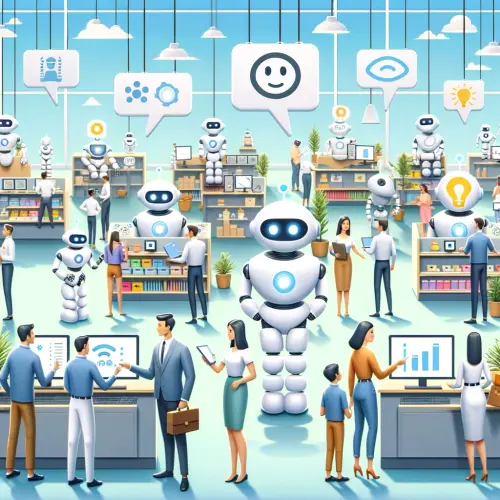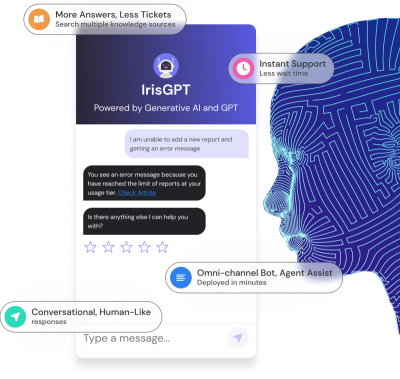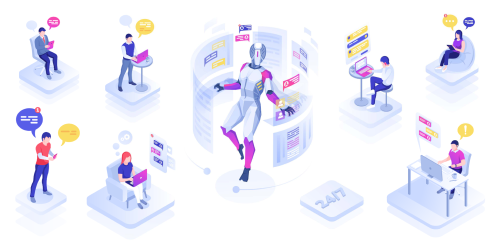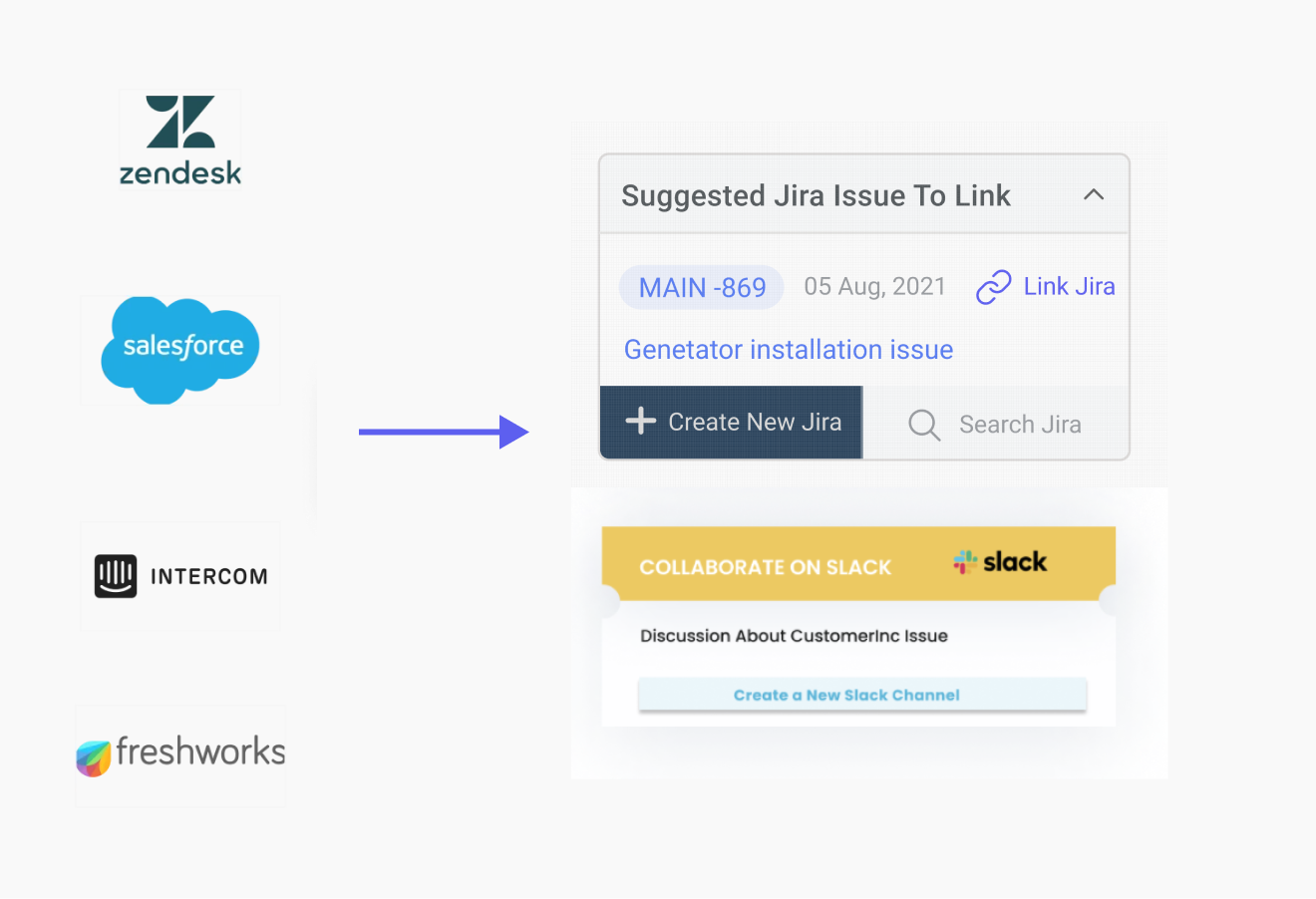How To Use AI in Customer Service: A Complete Guide
Introduction
In today's digital era, great customer service plays a crucial role in determining the success of businesses. With rapid technological advancements, Artificial Intelligence (AI) has emerged as a game-changer in the customer service industry. Businesses can leverage AI capabilities to enhance customer support operations, streamline processes, and deliver more personalized and consistent service experiences. In this article, we will explore the various use cases of AI in customer service and how they transform how businesses interact with their customers.
Overview of the increasing role of AI in customer service
The integration of AI technologies into customer service operations has witnessed a remarkable surge in adoption across industries. From small businesses to multinational corporations, organizations are harnessing AI-powered solutions to streamline support processes, enhance customer experiences, and drive operational efficiencies. AI customer service chatbots are being used to answer basic queries and provide customer-specific information quickly, allowing customer support staff to focus on more complex issues and improve the overall customer experience while lowering operating expenses. AI-driven chatbots, virtual assistants, and predictive analytics tools are revolutionizing the way businesses engage with their customers, offering faster response times, personalized interactions, and proactive support. Moreover, advancements in natural language processing (NLP) and machine learning algorithms have further fueled the capabilities of AI in understanding and meeting customer needs, propelling it to the forefront of modern customer service strategies.
Importance of understanding AI for businesses in improving customer support
In today's competitive landscape, understanding and leveraging AI in customer support is imperative for businesses striving to deliver exceptional experiences and stay ahead of the curve. AI technologies offer unparalleled opportunities to optimize support operations, enhance efficiency, and elevate the quality of customer interactions. By harnessing AI-driven solutions, businesses can provide faster, more personalized support experiences, resulting in higher customer satisfaction, loyalty, and customer retention. Furthermore, AI enables businesses to unlock valuable insights from vast amounts of customer data, empowering data-driven decision-making and strategic planning. Therefore, for businesses committed to delivering superior customer support experience and gaining a competitive edge, a deep understanding of AI is indispensable.
Purpose and structure of the guide
The purpose of this guide is to equip businesses with the knowledge and insights necessary to harness the power of AI in their customer service endeavors. Structured as a comprehensive resource, this guide delves into the fundamental concepts of AI in customer service, explores various AI technologies commonly used in support operations, and outlines best practices for successful implementation. Through practical guidance, real-world examples, and actionable advice, this guide aims to empower businesses to leverage AI effectively, optimize support processes, and deliver unparalleled customer experiences. Whether you're a seasoned customer service professional or new to the realm of AI-driven customer service, this guide offers valuable insights and strategies to help you navigate the evolving landscape of customer support software and unlock the full potential of AI as an AI tool for your business.
Understanding AI in Customer Service
Artificial Intelligence (AI) has emerged as a transformative force in the realm of customer service, revolutionizing how business service professionals interact with their customers. This section delves into the core concepts of AI in customer service, including its definition, applications, types of technologies, and the myriad benefits it brings to our customer support teams and operations.
Definition of AI and its applications in customer service
At its core, Artificial Intelligence (AI) refers to the simulation of human intelligence processes by machines, allowing them to perform tasks that typically require human intelligence, such as learning, reasoning, and problem-solving. AI assists customer service agents by providing intelligent routing, relevant help center articles, and suggested responses to customer inquiries. In customer service, AI is harnessed to automate and augment various aspects of support interactions, spanning from initial inquiries to post-purchase assistance. AI applications in customer service encompass a wide range of functionalities, including chatbots for instant messaging support, natural language processing (NLP) for understanding and generating human-like responses, virtual assistants for personalized assistance, artificial intelligence in customer service, and predictive analytics for anticipating customer needs and behaviors. By leveraging AI and self-service, businesses can provide faster, more efficient, and personalized support experiences, thereby enhancing customer satisfaction and loyalty.
Types of AI technologies commonly used in customer support
Several types of AI technologies are commonly employed in customer support to automate processes, personalize the customer support process and interactions, and derive insights from customer data. Chatbots, powered by NLP algorithms, enable businesses to engage with customers in real time, addressing inquiries, providing information, and resolving issues without human intervention. Virtual assistants leverage machine learning algorithms to understand customer preferences and behaviors, delivering tailored recommendations, and solutions. Predictive analytics tools analyze historical customer interactions to forecast future trends, enabling businesses to anticipate customer needs, identify opportunities, and optimize support strategies. Additionally, sentiment analysis tools utilize AI to analyze all customer conversations, feedback, social media mentions, and reviews, providing insights into customer satisfaction levels and sentiment trends. By leveraging these AI technologies, businesses can streamline support operations, improve efficiency, and deliver more personalized and proactive customer experiences.
Benefits of AI in Customer Service for Customer Satisfaction

AI has improved customer service by using AI customer support software and providing round-the-clock support, interactive voice response, instant responses, and personalized suggestions. It can handle numerous customer queries simultaneously, reducing waiting time. AI also aids the customer service team in understanding customer behavior and preferences, leading to a more customized customer experience, and increased customer satisfaction.
Artificial Intelligence (AI) has become a game-changer in customer service, revolutionizing how businesses interact with their customers. With its ability to analyze data, automate processes, and provide personalized experiences, AI has significantly improved customer service in several ways.
One of the most noticeable improvements brought about by AI is the introduction of AI solutions of AI customer service chatbots and virtual assistants. These AI-powered tools can handle basic customer inquiries, provide instant and relevant responses, and offer support 24/7. By leveraging natural language understanding algorithms, chatbots can understand customer queries and provide accurate and timely solutions. This reduces customer waiting times and ensures round-the-clock availability, improving overall customer satisfaction.
AI has also played a crucial role in delivering personalized customer experiences. By analyzing vast customer data, AI systems can understand individual preferences, purchase history, and other customer behavior patterns. This enables businesses to offer tailored product recommendations, self-service options, customized marketing messages, and personalized offers. Customers feel valued and appreciated when businesses understand their unique needs, resulting in increased customer loyalty and loyal customer satisfaction.
Moreover, AI-powered voice recognition and NLP technologies have transformed how customers interact with businesses. Through voice assistants like Amazon Alexa, Apple Siri, or Google Assistant, customers can perform tasks, seek information, and purchase using voice commands. These technologies understand and interpret natural language, making interactions more intuitive and convenient for customers.
The 8 best use cases of AI in Customer Service in 2023
1. AI Chatbots and Virtual Assistants
One of the most prominent applications of AI in customer service is the use of chatbots and virtual assistants. AI customer service chatbots provide customer-specific information quickly, allowing customer support staff to focus on more complex issues and improve the overall customer experience while lowering operating expenses. These AI-powered tools can handle basic customer inquiries, provide instant responses, and offer support around the clock. Chatbots utilize natural language processing (NLP) algorithms to understand and respond to AI and customer service call queries accurately. They can be integrated into websites, messaging platforms, and mobile applications, ensuring prompt and efficient customer service without human intervention.

2. Personalized Customer Experiences
AI enables customer service teams to gather, analyze, and utilize customer data to create personalized experiences. By leveraging their machine learning capabilities and algorithms, AI systems and customer service software can process vast amounts of data to understand customer preferences, purchase history, and behavior patterns. This data can deliver personalized product recommendations, relevant responses, tailored marketing messages, and targeted offers, thereby enhancing customer satisfaction and fostering long-term loyalty and customer relationships.
3. Voice Recognition and Natural Language Processing (NLP)
AI-powered voice recognition and NLP technologies have revolutionized how customers interact with businesses. Through voice assistants like Amazon Alexa, Apple Siri, or Google Assistant, customers can perform tasks, seek information, and even purchase using voice commands. These technologies understand and interpret natural language, allowing seamless and intuitive interactions between customers and businesses.
4. AI-Powered Sentiment Analysis
Understanding customer sentiments is vital for customer service teams to gauge customer satisfaction, identify potential issues, and make necessary improvements. AI-based customer sentiment analysis tools analyze customer feedback, including social media posts, reviews, and surveys, to determine the overall sentiment toward a brand or product. This valuable insight into customer journey helps businesses make data-driven decisions, improve their products and services, and address customer questions and concerns promptly.

5. Intelligent Call/Ticket Routing and Predictive Analytics
Customer support AI software can optimize call center operations by intelligently routing calls to the most suitable customer service agents based on customer needs and agent availability. By analyzing customer support requests and historical interactions, AI for customer service systems can predict the customer's intent and assign the call to the most appropriate agent, reducing wait times and enhancing the agent productivity and overall personalized customer service experience. Additionally, predictive analytics algorithms can identify patterns and trends from customer calls and requests to anticipate customer needs and proactively address them.
6. Customer Feedback Analysis
AI-powered tools can automate repetitive tasks of analyzing customer feedback by extracting insights from various sources of customer history such as surveys, emails, social media, and customer service interactions. AI algorithms can identify key themes, customer messages, sentiments, and emerging issues from large volumes of unstructured data. This analysis helps businesses gain a deeper understanding of customer opinions and customer experience, enabling them to make informed decisions and implement targeted improvements to improve customer satisfaction.
7. Improved Customer Support Workflows
Artificial Intelligence (AI) plays a pivotal role in enhancing customer support workflows, significantly reducing friction from the initial interaction with a product to subsequent engagements. By deploying AI-powered chatbots, businesses can swiftly address routine customer queries, ensuring rapid response times that enhance user satisfaction. These chatbots not only facilitate immediate communication but also possess the capability to generate personalized emails or content for existing clients, tailoring communication to individual needs. Beyond handling inquiries, AI streamlines overall business processes, optimizing customer support interactions through intelligent automation and predictive insights. This not only maximizes efficiency but also elevates the customer experience by ensuring that support is both proactive and highly responsive to their needs.
Artificial Intelligence has transformed customer service by offering innovative solutions to enhance customer experiences. Chatbots, virtual assistants, voice recognition, and sentiment analysis have revolutionized customer interactions. Furthermore, AI's ability to analyze vast amounts of customer data and provide predictive insights allows businesses to personalize offerings to increase customer satisfaction and improve operational efficiency. As businesses embrace AI technology, customer service will become more efficient, personalized, and responsive, ultimately driving customer satisfaction and loyalty to new heights.
Best Practices for AI-Driven Customer Service
In the rapidly evolving landscape of customer service, the integration of Artificial Intelligence (AI) into customer service tasks has emerged as a powerful tool for businesses seeking to enhance customer experiences and streamline support operations. However, the successful implementation of AI in customer service requires adherence to best practices to ensure the effectiveness, efficiency, and ethical use of ai tools. This section explores key best practices for AI-driven customer service, encompassing the design of customer-centric experiences, the balance between self-serve resources, automation, and human touch, data privacy and security considerations, and methods for monitoring and measuring the effectiveness of customer service software and AI implementations.
Designing customer-centric AI experiences
Designing AI experiences with a focus on the customer is paramount to their success. AI-powered interactions should be tailored to meet the diverse needs and preferences of customers, providing value and convenience at every touchpoint. Start by understanding customer pain points, preferences, and communication channels to inform the design of AI solutions. Develop AI interfaces that are intuitive, conversational, and personalized, facilitating seamless interactions and enhancing user engagement. Continuously gather customer feedback and iterate on AI designs to ensure they remain relevant, effective, and aligned with evolving customer expectations.
Balancing automation with human touch in customer interactions
While AI automation offers numerous benefits in customer service, maintaining a balance with human interaction is essential for delivering empathetic, personalized support. Identify scenarios where human intervention is necessary, such as handling complex issues, demonstrating empathy, or providing emotional support. Train AI systems to recognize these scenarios and seamlessly escalate inquiries to human customer support agents when needed. Additionally, empowers human support agents with AI-driven insights and tools to augment their capabilities, enabling them to provide more personalized and efficient support. Striking the right balance between automation and human touch ensures that customers receive the best of both worlds – the efficiency of the automation tools and the empathy of human customer interaction throughout.
Ensuring data privacy and security in AI-driven customer service
Protecting customer data is paramount in AI-driven customer service implementations to build trust and maintain compliance with regulations. Implement robust data privacy and security measures to safeguard sensitive customer information from unauthorized access, breaches, or misuse. Utilize encryption techniques, access controls, and regular security audits to mitigate risks and ensure compliance with data privacy regulations such as GDPR or CCPA. Transparently communicate your data privacy policies to customers, assuring that their data is handled responsibly and securely. By prioritizing data privacy and security, businesses can build trust with customers and strengthen their reputation in the marketplace.
Monitoring and measuring the effectiveness of AI implementations
Regular monitoring and measurement of AI-driven customer service implementations are essential to evaluate their performance, identify areas for improvement, and drive continuous optimization. Define key performance indicators (KPIs) such as response times, resolution rates, CSAT scores, and operational efficiency metrics to track the effectiveness of AI implementations. Utilize AI analytics tools to gather insights from customer interactions, uncover trends, and identify opportunities for enhancement. Continuously iterate and optimize AI implementations based on data-driven insights and feedback from customers and agents. By monitoring and measuring the effectiveness of AI implementations, businesses can ensure they deliver value to customers and drive tangible business outcomes.
Try Our Customer Service AI Now!
Experience the future of customer service with our AI-powered solutions. Our cutting-edge AI technologies are designed to revolutionize your customer support team and operations, providing faster, smarter, and more personalized service experiences for your customers. Whether you're looking to automate routine inquiries with chatbots, deliver proactive support with predictive analytics, or enhance customer engagement with virtual assistants, our AI-driven solutions have you covered. Take advantage of our free trial to see firsthand how AI can transform your customer service and elevate your business to new heights. Don't miss out on the opportunity to delight your customers and stay ahead of the competition – try our customer service AI now or learn about AI in customer service!
FAQs on AI in Customer Service
What is AI in customer service?
In customer service, AI, or Artificial Intelligence, refers to the application of intelligent technologies and algorithms to automate, enhance, and personalize customer support interactions. It involves using chatbots, virtual assistants, voice recognition, sentiment analysis, and predictive analytics to improve customer service experiences and streamline customer service operations.
Can AI replace human customer service representatives?
While AI has automated certain aspects of AI customer support software and service process, it is not intended to replace human representatives and support team entirely. AI tools like chatbots can handle routine and repetitive inquiries, allowing human representatives to focus on complex issues that require empathy and critical thinking. AI and human agents can work together, with AI providing initial support and escalating complex cases to humans when necessary, creating a seamless and efficient customer service experience.
Is AI in customer service capable of understanding and responding to human emotions?
Yes, AI has significantly advanced in understanding and responding to human emotions. NLP algorithms enable AI systems to interpret the sentiment and tone of customer conversations and interactions, allowing them to provide empathetic and appropriate responses to handle customer requests and queries. Sentiment analysis tools can analyze customer data and feedback from various sources to gauge customer emotions and sentiments towards a brand or product, enabling businesses to address concerns and improve customer experiences.
What are the AI solutions in customer service?
AI solutions in customer service primarily involve the use of chatbots and virtual assistants, which automate responses to customer questions and inquiries, offering 24/7 assistance without the need for human intervention. These AI tools can handle a wide range of queries, from basic FAQs to complex account issues, improving over time through machine learning. Additionally, AI is used in sentiment analysis to gauge customer emotions and tailor responses accordingly, as well as in predictive analytics to personalize service offerings and anticipate customer needs before they arise. This suite of AI applications significantly enhances efficiency, CSAT, and personalized service delivery in the customer service domain.
Is AI in customer service secure and trustworthy?
Yes, AI in a customer service platform can be designed to be secure and trustworthy. IrisAgent's Customer Service AI provides robust security measures to protect customer data and ensure privacy. Additionally, AI algorithms can be continuously trained and updated to improve accuracy and prevent biases. Transparency in AI processes and providing clear information to customers about how their data is being used can help establish trust. Adhering to ethical guidelines and industry standards also ensures responsible and trustworthy AI implementation.



